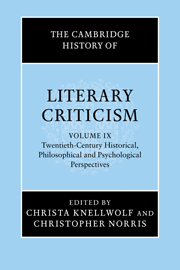Book contents
- Frontmatter
- Introduction
- HISTORY
- 1 Historicism and historical criticism
- 2 Literary criticism and the history of ideas
- 3 Cultural materialism
- 4 New historicism
- 5 Fascist politics and literary criticism
- MARXISM AND POST-MARXISM
- FROM CULTURAL POETICS TO CULTURAL STUDIES
- PSYCHOANALYTIC APPROACHES
- GENDER AND SEXUALITY
- COLONIALISM, POST-COLONIALITY, NATION AND RACE
- MODERNITY AND POSTMODERNISM
- PHILOSOPHY, AESTHETICS AND LITERARY CRITICISM
- INTERDISCIPLINARY APPROACHES
- Bibliography
- Index
- References
3 - Cultural materialism
from HISTORY
Published online by Cambridge University Press: 28 March 2008
- Frontmatter
- Introduction
- HISTORY
- 1 Historicism and historical criticism
- 2 Literary criticism and the history of ideas
- 3 Cultural materialism
- 4 New historicism
- 5 Fascist politics and literary criticism
- MARXISM AND POST-MARXISM
- FROM CULTURAL POETICS TO CULTURAL STUDIES
- PSYCHOANALYTIC APPROACHES
- GENDER AND SEXUALITY
- COLONIALISM, POST-COLONIALITY, NATION AND RACE
- MODERNITY AND POSTMODERNISM
- PHILOSOPHY, AESTHETICS AND LITERARY CRITICISM
- INTERDISCIPLINARY APPROACHES
- Bibliography
- Index
- References
Summary
In the opening chapter of The Long Revolution (1961), Raymond Williams argues that ‘[e]verything we see and do, the whole structure of our relationships and institutions, depends, finally, on an effort of learning, description and communication’. In what was to become a radical challenge to the dominant modes of literary and cultural study, Williams concluded that:
If all activity depends on responses learned by the sharing of descriptions, we cannot set ‘art’ on one side of a line and ‘work’ on the other; we cannot submit to be divided into ‘Aesthetic Man’ and ‘Economic Man.’
Williams goes on, in his chapter on ‘The Analysis of Culture’, to challenge an historical methodology based upon the assumption that ‘the bases of society, its political, economic, and “social” arrangements, form the central core of facts, after which the art and theory can be adduced, for marginal illustration or “correlation”’, and a literary methodology which privileged its own formal laws of composition while relegating this central core of facts to the status of ‘background’. His call in 1961 was for a cultural history which had to be ‘more than the sum of the particular histories, for it is with the relations between them, the particular forms of the whole organisation, that it is especially concerned’. Thus, Williams’ ‘theory of culture’ could subsequently be defined as ‘the study of the relationships between elements in a whole way of life’.
- Type
- Chapter
- Information
- The Cambridge History of Literary Criticism , pp. 43 - 58Publisher: Cambridge University PressPrint publication year: 2001

